Vietnam’s currency is the dong (₫ / VND). Small banknotes, such as 1,000 VND; 2,000 VND; and 5,000 VND; are usually made of paper, while higher-value notes, 10,000 VND; 20000 VND; 50,000 VND; 100,000 VND; 200,000 VND and 500,000 VND, are printed on durable polymer and all feature President Ho Chi Minh. A fun fact for visitors is that even with a small amount of foreign currency, you can quickly become a “Vietnamese millionaire”, an experience that often surprises and delights first-time travelers.
Read more:
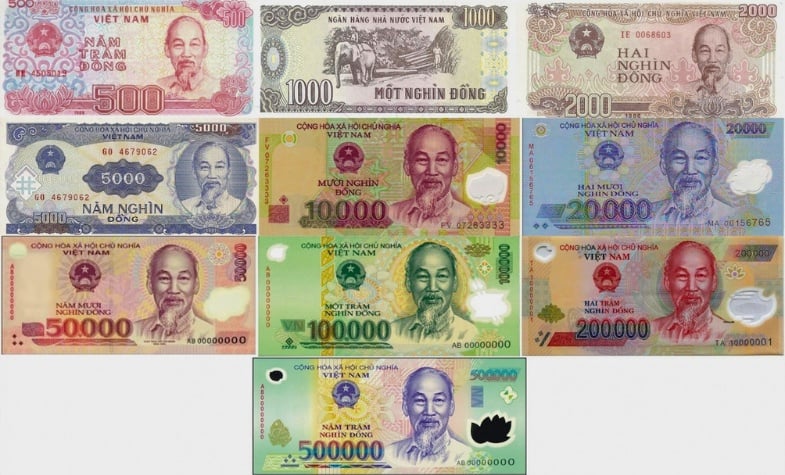
Currency Usage
The Vietnamese dong is the only legal tender for transactions in Vietnam. According to regulations, all goods and services must be listed and paid for in VND. Foreign currency transactions are only legal when conducted through licensed exchange points.
In practice, in tourist areas, USD or other popular currencies like EUR, AUD, and GBP may be accepted at some restaurants, hotels, or souvenir shops. However, this is not common in local or rural areas, where only VND is accepted. Therefore, carrying Vietnamese ng is always the safest and most convenient option.
It's a good idea to have small denominations (1,000 – 20,000 dong) for minor expenses like taxi fares, street food, or entrance tickets. Be sure to check the condition of the bills - torn or worn bills may be rejected. Additionally, the 20,000 dong and 500,000 dong bills have similar colors (both greenish), making them easy to confuse - so it's a good idea to keep them in separate spots in your wallet to avoid mistakes.
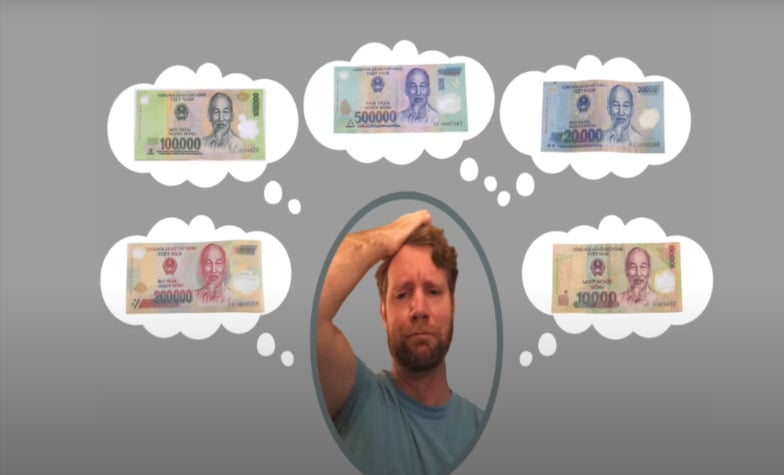
Exchanging Money in Vietnam
The exchange rate between the Vietnamese dong (VND) and strong foreign currencies like the US dollar (USD) can fluctuate depending on the economic situation, particularly due to inflation or the government's monetary policy. As of May 2025, the exchange rate for USD/VND ranges from 25,900 to 26,000 VND per USD. However, this number can change daily, depending on the bank or exchange point.
When exchanging foreign currency for Vietnamese ng, the safest and most common option is to do so at commercial banks like Vietcombank, BIDV, or Techcombank. These institutions offer transparent exchange rates, clearly posted rates, and ensure the legality of the transactions. Foreign tourists need to bring their passport or ID when making exchanges and may sometimes have to wait due to verification procedures.
Another option is to exchange money at international airports like Noi Bai (Hanoi) or Tan Son Nhat (Ho Chi Minh City). Exchange counters here are convenient, especially for those who have just arrived in Vietnam and need cash immediately. However, exchange rates at the airport are usually less favorable than those at banks and may come with higher service fees.
Additionally, some people choose to exchange money at gold shops because the exchange rate may seem more attractive. However, this method carries risks. If you exchange money at unlicensed establishments, you could receive counterfeit money, be scammed, or even violate the law. If you choose to exchange money at a gold shop, make sure it is a reputable establishment listed by the State Bank of Vietnam.
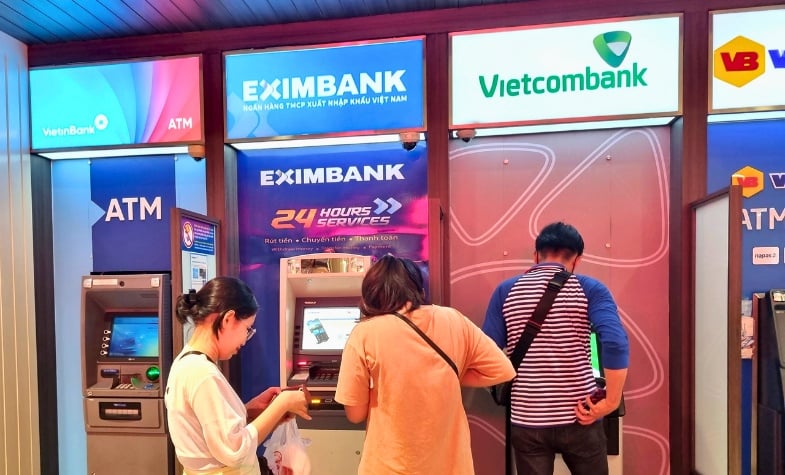
ATM and Credit Cards
ATMs are common in most major cities and tourist destinations in Vietnam. Tourists can easily find ATMs from large banks such as Vietcombank, Agribank, VietinBank, and Sacombank. Many ATMs support international cards like Visa, Mastercard, Cirrus, or JCB, making it convenient to withdraw VND using foreign cards.
International banks such as HSBC, ANZ, and Citibank also have branches and ATMs in major cities like Hanoi and Ho Chi Minh City.
For withdrawal limits, each transaction usually allows withdrawals of about 2,000,000 ng. Some banks, such as ANZ, may allow higher withdrawals depending on the type of card and their policies. If you need to withdraw a large amount, you can make multiple transactions or go directly to the bank.
The fee for withdrawing money with an international card at an ATM is usually between 20,000 and 40,000 dong per transaction, not including any fees charged by the bank that issued the card. When using a credit card, you might be charged an additional service fee of around 3% of the total amount. The American Express (Amex) card is less common in Vietnam and typically comes with higher fees — around 4%. Therefore, if you plan to use Amex, check ahead for card acceptance at your destination.
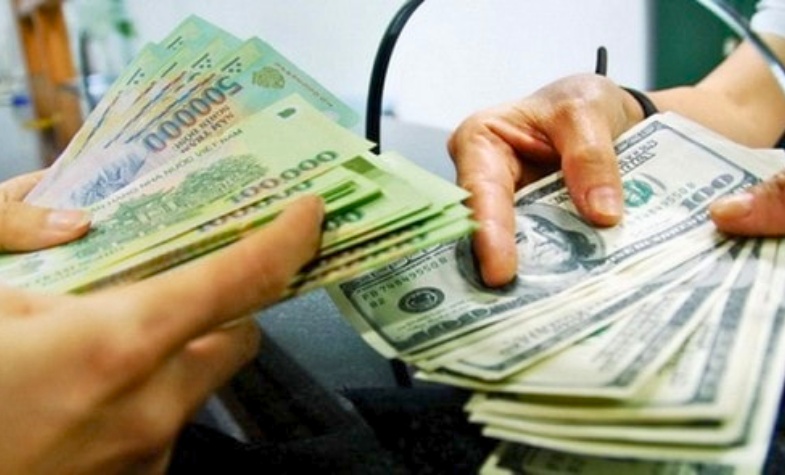
Traveler’s checks are no longer common in Vietnam. Some banks still exchange checks, but you will need to present a passport and pay a conversion fee of 2-5%. If the checks are not issued in USD, they are more likely to be rejected
Travel Costs in Vietnam
Travel expenses in Vietnam are quite flexible and cater to various types of travelers, from budget-conscious tourists to those seeking luxury experiences. Generally, the cost of living in Vietnam is lower than in many Western countries, allowing you to enjoy many amenities and services at a reasonable price.
For dining, street food is a popular and affordable option, typically costing just 2 to 3 USD per meal. Not only is this a budget-friendly choice, but it also offers a chance to experience local cuisine. For a more comfortable experience, casual restaurants offer complete meals for about 5 to 8 USD, while upscale restaurants can range from 12 to 15 USD per meal, usually including drinks.
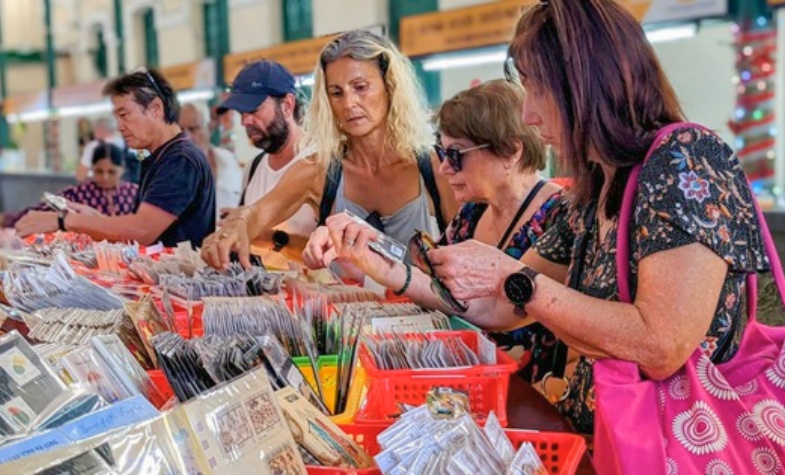
When it comes to drinks, Vietnam offers a wide variety. A glass of local beer at a street-side bar typically costs 1 to 2 USD, while cocktails at bars or upscale restaurants range from 3 to 6 USD, depending on the location and brand.
Shopping is a highlight of visiting Vietnam. Due to low production costs, handmade crafts, fashion clothing, porcelain, paintings, wood carvings, and local souvenirs are all affordably priced, making great gifts or collectibles. Traditional markets and the Old Quarter are great places to find unique items that reflect Vietnam's cultural heritage.
Tipping in Vietnam
Tipping in Vietnam is not mandatory in the culture, but it is increasingly seen as a polite gesture and a way to show appreciation for good service. Although it is not as common as in some Western countries, leaving a tip will always be appreciated and can encourage excellent service.
When dining at local eateries, you can leave a small tip, such as 1 USD per person, as a simple thank you. For upscale restaurants, especially those serving international tourists, a tip of around 10-15% of the total bill is appropriate and often expected.
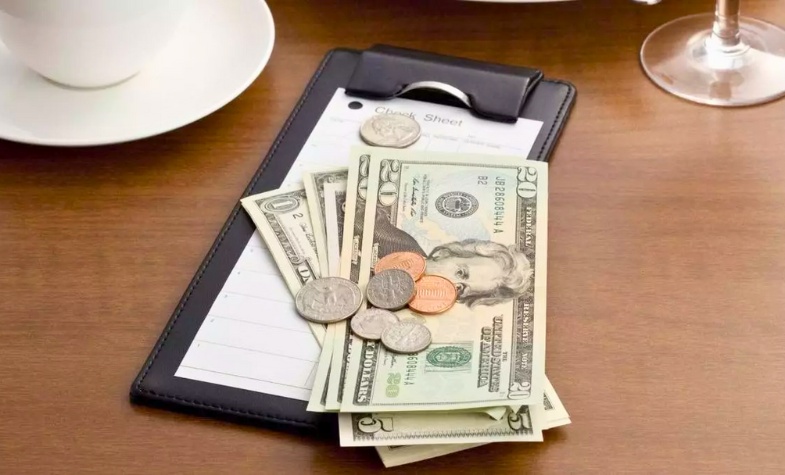
For transportation and tour guide services, tipping is also part of the service culture. For a private driver, solo tourists can tip about 5 USD per day, while groups should consider 10 to 15 USD per day, shared among the group members. If you are traveling with a tour guide, a reasonable tip is 2-4 USD per person per day for group tours, and 5-7 USD per day for private tours.
One thing to note is that in many restaurants or hotels, the bill may already include a service charge of around 5%. However, this fee typically does not go directly to the service staff. Therefore, if you are satisfied with the service, leaving cash directly for the staff is the best way to express your appreciation.
How to Detect Fake Vietnamese Currency
-
Recognizing counterfeit money is an important skill, especially for tourists new to Vietnam or during everyday cash transactions. Although Vietnamese money, especially larger denominations, is printed on high-security polymer material, fake currency does circulate. To avoid risks, you should check a few basic security features:
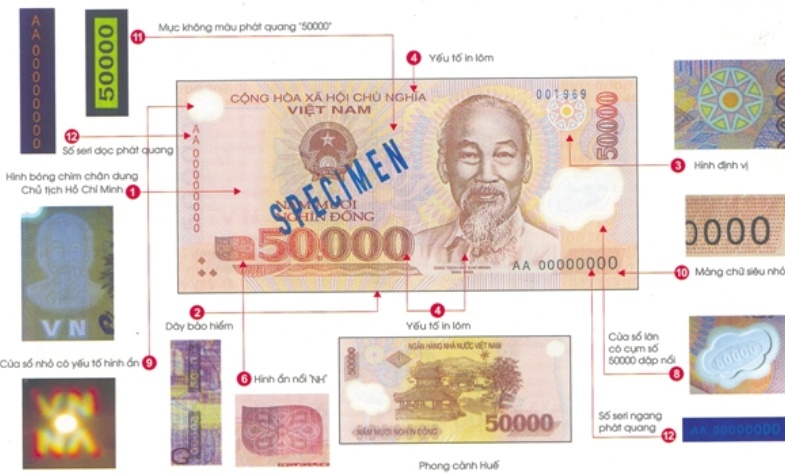
-
Material: The first thing to check is the material. Genuine polymer money has a slightly glossy surface, is waterproof, hard to tear, and has a slight elasticity when gently crumpled in your hand. Fake money is usually softer, crumples easily, is dull, and feels flimsy.
-
Color-changing Ink: On denominations from 50,000 ng upwards, when you tilt the bill under light, you'll notice a color-shifting ink region in the lower-left corner that changes from green to blue. Fake money typically does not exhibit this effect or has a faint imitation.
-
Watermark: When holding the bill up to the light, you'll clearly see the portrait of President Ho Chi Minh or the bill's denomination as a watermark. On counterfeit bills, the watermark is often blurry or uneven due to lower-quality printing.
-
Raised Print: Real money has raised printing, especially in the words “Ngân hàng Nhà nước Việt Nam” (State Bank of Vietnam) on the bill. When you run your fingers over the bill, you'll feel the raised texture, whereas counterfeit bills are usually flat and lack this tactile feature.
-
Serial Number: Genuine bills have clear, consistent, straight serial numbers printed with high-quality ink that won’t smudge or blur. Fake bills typically have faint or inconsistent serial numbers, and the color may not match the rest of the bill.
Our tours you may like:
***
Travel Authentic Asia Company is your best choice for discovering the beauty of Southeast Asia. Our experienced and knowledgeable travel advisors are committed to helping you create a tailor-made tour and extraordinary experiences in this majestic region.
If you're looking for an authentic cultural experience, do not hesitate to contact Travel Authentic Asia to choose a Vietnam tour, Southeast Asia tour package or to customize your own style tour to South East Asia.

